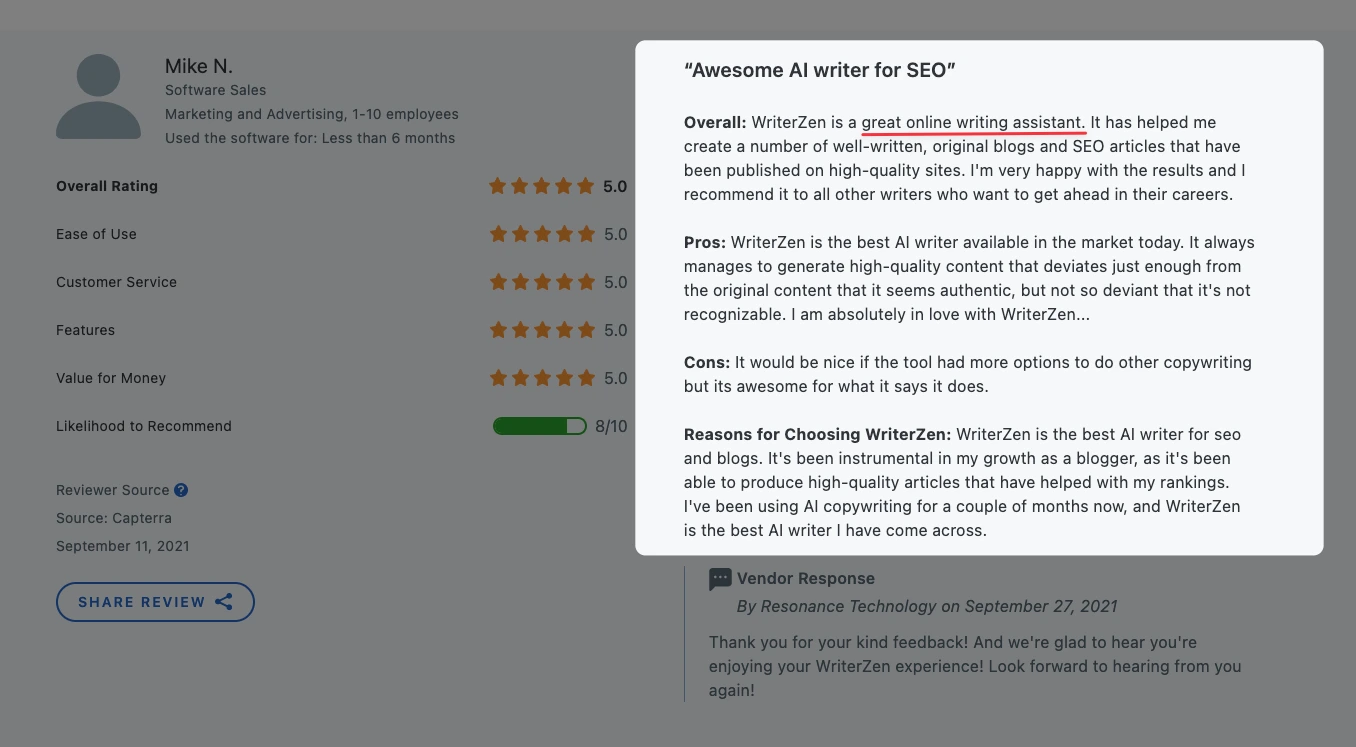A popular Chinese adage, shall we?
“千里之行,始于足下。”
We’ll get to its translation in a minute.
But just to let you know, this proverb is one you must have heard a thousand times. It crossed my mind when researching this piece as it relates to every sphere of life, including content marketing.
In English, it means:
“A journey of a thousand miles begins with a single step.”
The proverb teaches that even the most challenging activities have a starting point. And that also applies to the job of managing content programs.
Every article you write starts with the first word. Before that, however, there’s something else every great content published on the web stems from— an idea.
Every great piece of content was once an idea.
Unfortunately, such great ideas aren’t easy to come by.
It’s why you’re on this page, trying to find a remedy for your lack of interesting topics to write about. And it’s not just you.
In 2015, over half of the marketers surveyed by Kapost revealed they didn’t have enough ideas for content production. Even now, in 2022, according to HubSpot, finding ideas for new content is still a top challenge marketers face with content marketing.
A lack of ideas can hinder you from creating great content. It’s a problem that’ll further affect your KPI at work or thwart clients’ results.
Fortunately, that’s what this piece covers.
You’ll discover how to find topics when you get stuck. Also, you’ll learn how WriterZen, a simplified content workflow tool, assists content managers in finding the best topics (and ideas) to power their content strategies.

WriterZen review on G2
Interesting Topics - the Soul of Content Marketing
In 2021, HubSpot ran a survey to know why people read blogs.
Their findings?
About 33% of readers do so to learn something new, 20% said they read for entertainment, while 12% read blogs to stay informed about industry news.
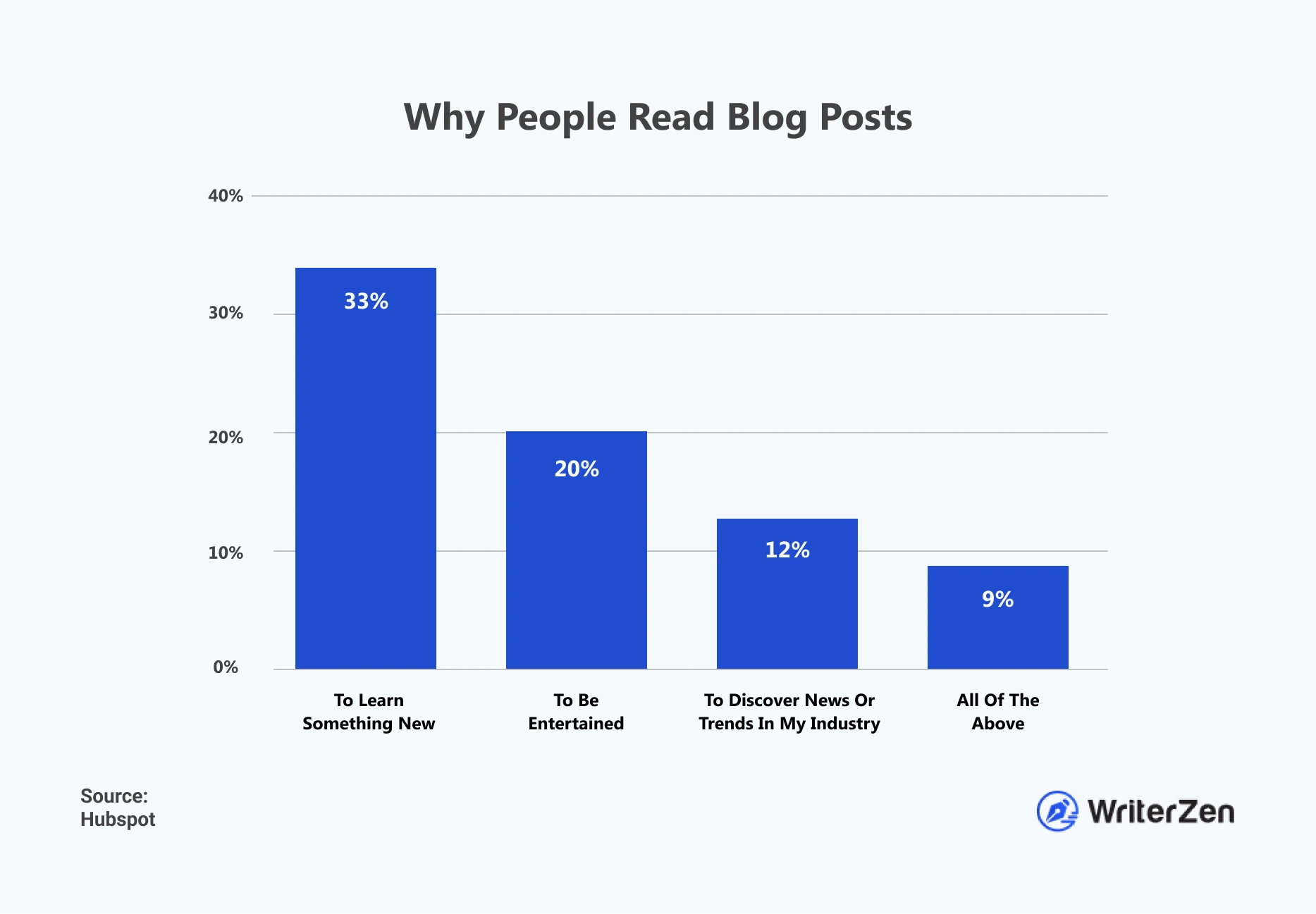
And there’s a common thread these reasons share: interest.
If your audience isn’t interested in your topic, they’d go elsewhere to get informed or entertained. And if they’re interested but don’t find your content interesting, they’d still pass.
In other words, finding content ideas shouldn’t be your only focus.
It’s crucial you go a step further to ensure every topic on your blog interests your audience. Only then would you be able to entertain while educating and informing readers.
Rebecca Riserbato, Content Strategist at Scorpion, quips:
“Great content is an important asset. It has the ability to create positive experiences for your potential customers and compel them to come back for more. It's your ticket to capturing your audience's attention and continually reinforcing a positive brand impression.”
But just like every good thing, this doesn’t come easily.
Most times, it requires lots of brain work. And other times, these engaging topics become scarce, making you wonder...
Why is It Difficult to Find Interesting Content Ideas?
According to Semrush’s State of Content Marketing 2022 Global Report, 72% of companies plan to increase their content marketing budget in 2022.
Despite this content rave, 25% of marketers, according to the same study, still struggle to generate content ideas that resonate with their target audiences.
This happens for two major reasons:
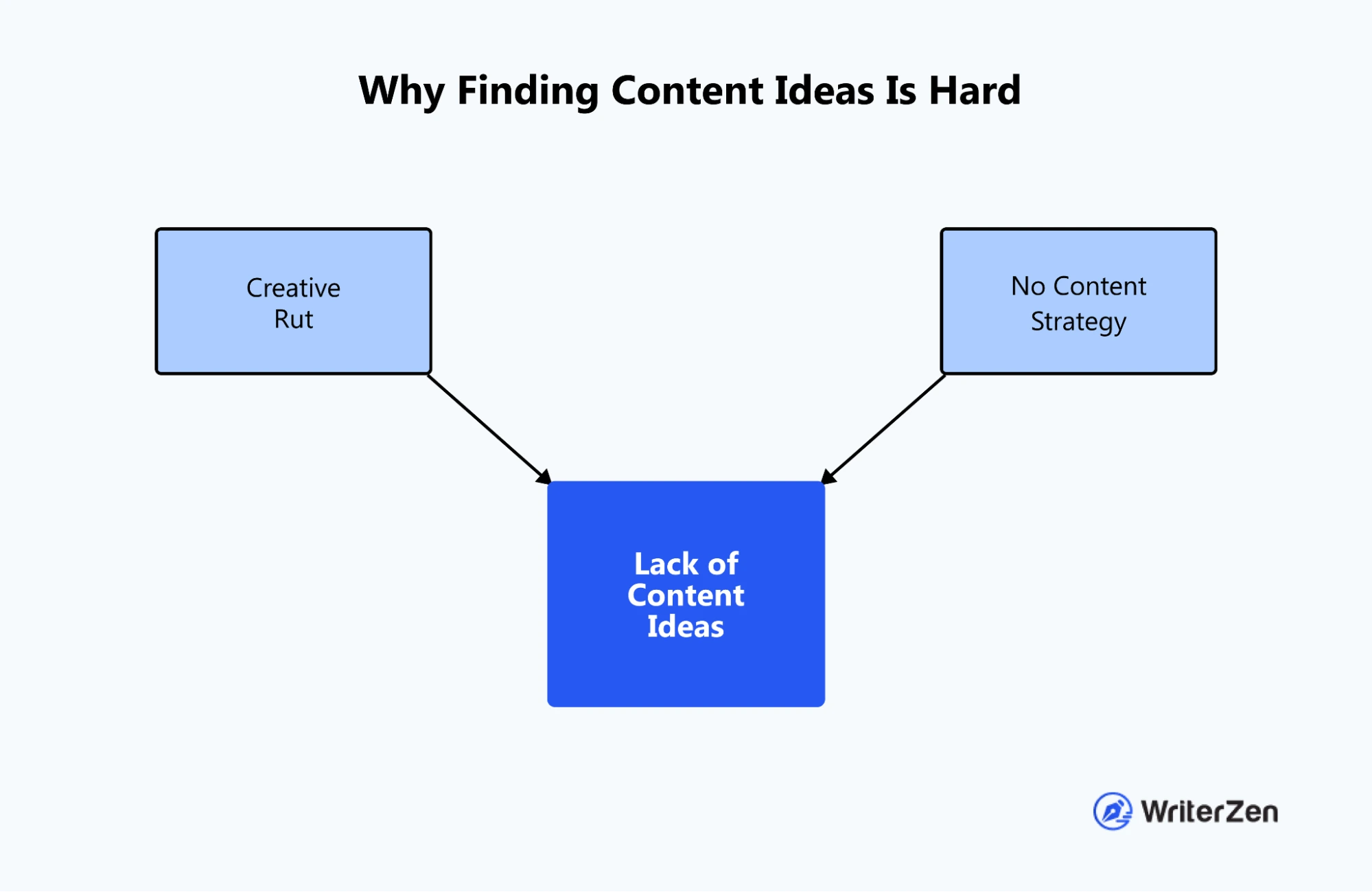
Creative Rut
You feel stuck.
The ideas aren’t flowing. All you see is your blank screen staring back at you, waiting for you to flood it with words, yet the words won't come.
Situations such as the one above are what Bryan Collins, Content Writer at Become a Writer Today, defines as creative rut:
“A temporary inability to properly express that creativity.”
It’s not the same as a lack of creativity. Instead, a creative rut is that fleeting yet tedious moment of writer’s block that frustrates and stalls every creator.
Todd Henry, Founder of Accidental Creative, mentioned seven deadly sins of mediocrity responsible for this rut creatives face.
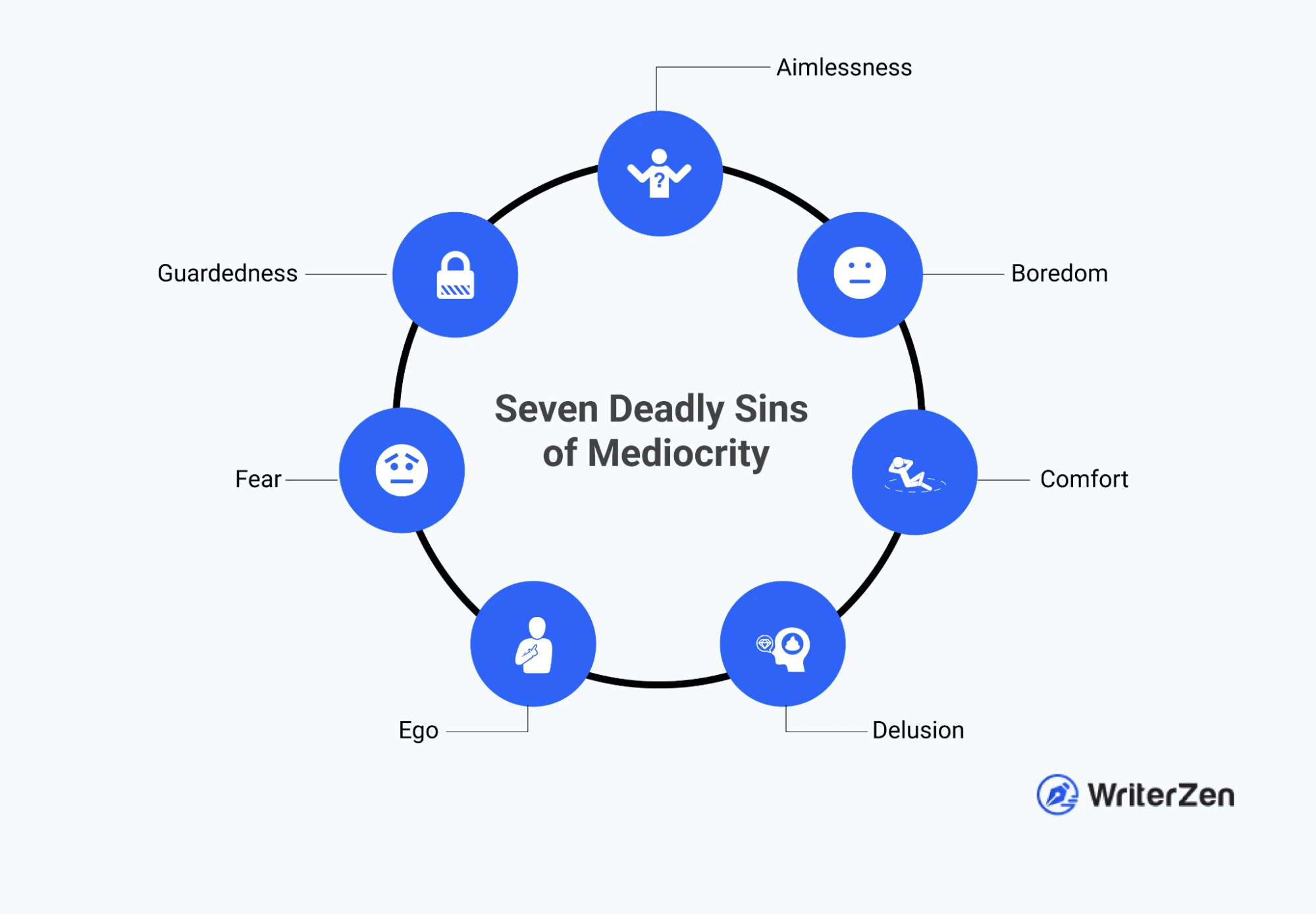
Todd went further to add that creative workers need two things to spark creativity: stability and challenge.
For stability, he opined:
“If you give people complete freedom, it’s not very helpful. If somebody just tells you to [write] whatever you want, that’s not helpful. If you have even just a little bit of direction, it gives you a starting point. It helps your creative juices flow.”
Speaking of direction, let’s proceed to the second reason you struggle to find interesting blog ideas to write about.
Lack of a Well-Defined Content Strategy
Writing whatever you want isn’t helpful.
There’s a high chance the topic you deem engaging may not be valuable to your audience or clients’ goals. And in the end, you create fluffy content.
What’s worse is sooner or later, you’ll fall back into that creative rut. Because, well, those seven deadly sins would sneak up on you, and you’ll be back at that terrible spot, racking your brain for cool topics to write about.
What if, instead of second-guessing your next content moves or choosing random ideas, you had direction?
That direction is a well-documented content strategy.
Over 78% of marketers who believe their content marketing was very successful in 2021 had a documented content marketing strategy.
However, creating a reliable content strategy is challenging.
An excellent way to ease this challenge is by adopting topic clusters.
It involves grouping content around topics.
This helps you achieve topical authority while organizing your site architecture. But more importantly, it also acts as a reservoir of content ideas.
The only challenge with this unique approach is: How do you find these topics and ideas to cluster content around them without going through back-breaking, time-consuming research?
Enter WriterZen.
WriterZen’s Topic Discovery helps you find related topics completely clustered with content ideas from just one seed keyword. This saves you from:
-
Hacking various SEO tools,
-
Moving data to and fro spreadsheets, and
-
Sorting them manually for hours.
As we said, it starts by entering your seed keyword:
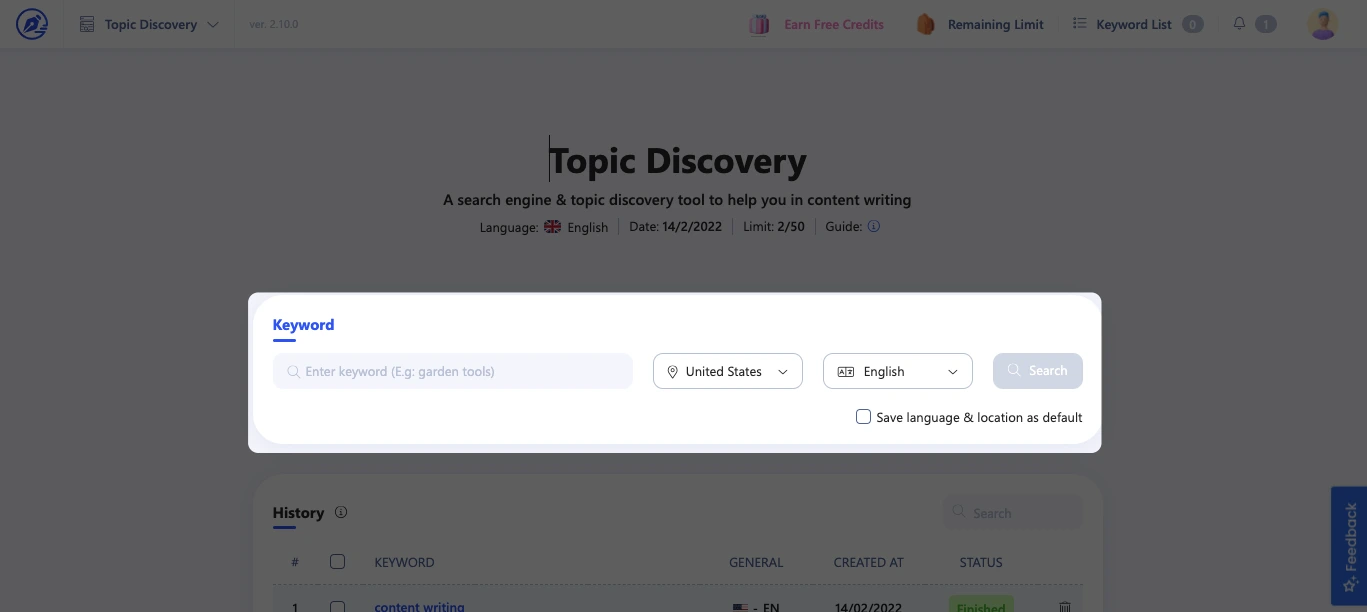
And in a few seconds, you’ll have the related topics you need to build your content strategy in hours, not weeks:

WriterZen review on G2
We’ll come to how WriterZen helps you build your content strategy in a minute. But first, let’s see…
How to Find Interesting Topics to Write About
A content strategy helps you document topics and content goals. But without content ideas, you’ll struggle to build those topics and achieve your strategic goals.
Below are ways to never run out of topics (and ideas) your audience finds interesting:
Examine How Your Target Audience Research
How do your target audience research topics?
If they’re like everyone else who uses the Internet, their best bet is Google. And then they may go further to drop questions on your company’s social media groups or hold conversations on Twitter, Facebook, LinkedIn, or online forums like Reddit, Quora, etc.
Listening to their frustrations by understanding how they research topics helps you identify content ideas your target audience find interesting.
You have two ways to go about this:
-
Either you visit and scroll manually from one forum to another and spend time analyzing what you find or…
-
You use a tool that provides insights into your target audience's questions about specific topics.
WriterZen’s Keyword Explorer is the 2nd option above.
It offers you those insights into topics your target audience are researching, so you can identify new ideas to power your content engine.
To illustrate, let’s enter our “online learning” keyword into the Keyword Explorer tool. On the Insights tab, you’ll see questions, prepositions, comparisons, etc., related to the topic.
Like this:
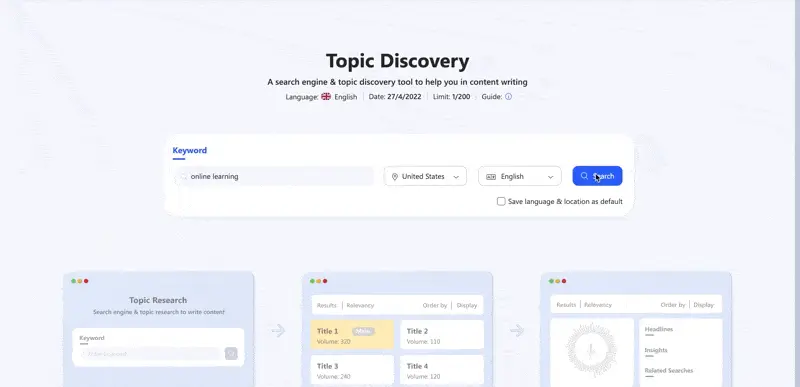
Do Keyword Research
Keith Goode, Principal SEO Product Manager for Cox Automotive, opined:
“Keyword research is foundational to the whole marketing strategy. They represent conversations your customers have.”
About 92% of search marketers perform keyword research in advance of new content. From researching keywords, you find competing articles, related questions, clusters, content outlines, and other vital metrics that inspire interesting ideas.
Unfortunately, this process is never an easy one for content managers. And if you aren’t careful, you may wind up:
-
Targeting keywords that don’t suit your SEO campaign, or
-
Juggling different tools that worsen the already overwhelming process.
WriterZen helps you avoid that stress.
Plug your keyword in the Keyword Explorer, and immediately, you:
-
Get relevant keyword data at a glance,
-
Find fast-ranking keywords in minutes,
-
Collate selected keywords, and
-
Get enough ideas for interesting blog articles.
See for yourself:
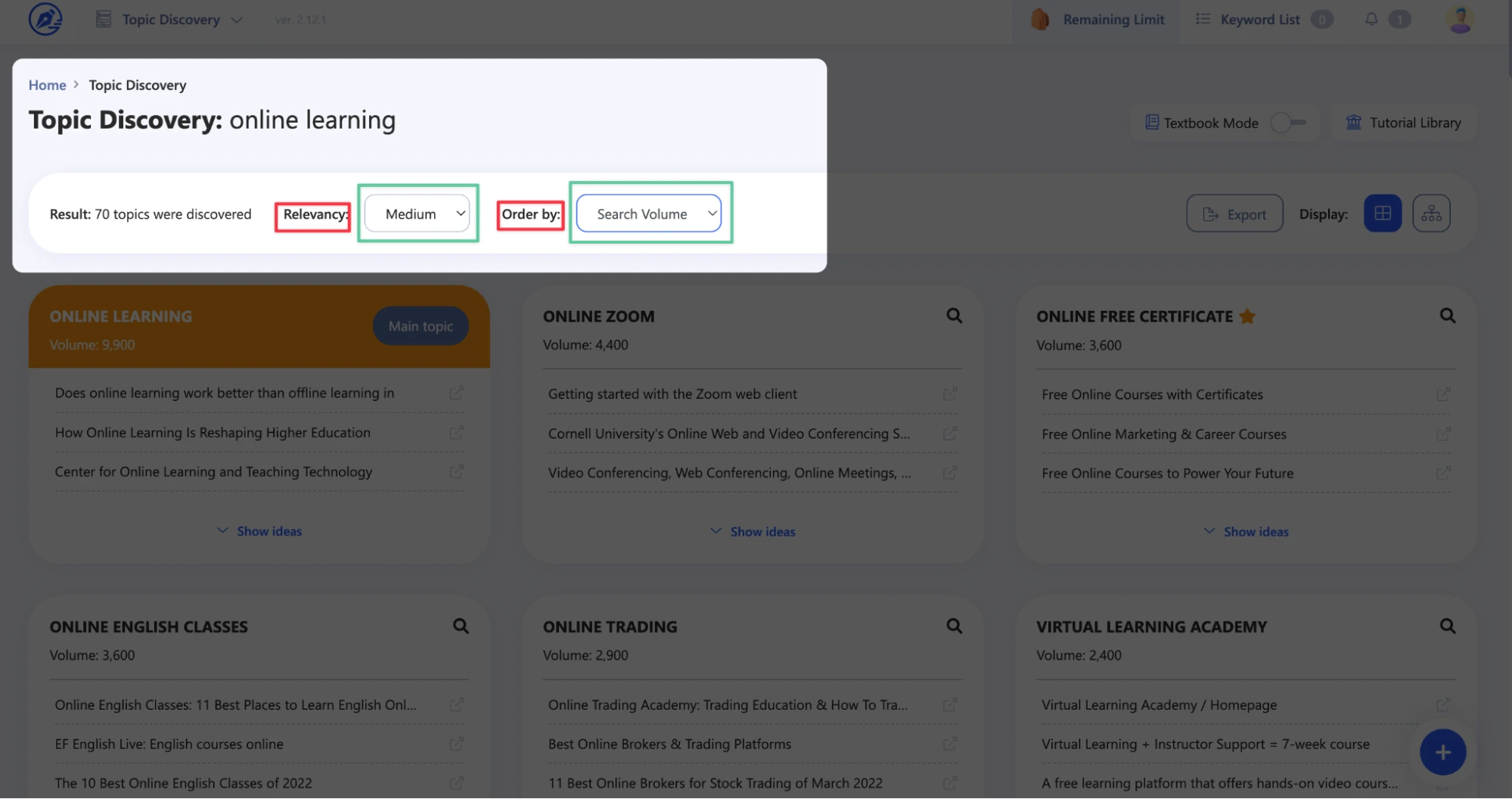
Get Inspired from Past Articles
You aren’t just starting out in content marketing. You’ve written articles in the past and plan to keep writing.
But don’t let past articles remain in the past. Review your old blog posts to keep them fresh, up-to-date, and better optimized for search engines.
Besides reviewing these articles for SEO, you just may find new content topics in them.
A hack to go about this is to check what keywords a particular blog post is ranking for. Then input that keyword in an SEO tool to see other terms that can serve as potential ideas for subsequent blog posts.
If WriterZen is your chosen tool, head to the keyword cluster section so you can group related keywords per topic and export them once you’re done.
See:
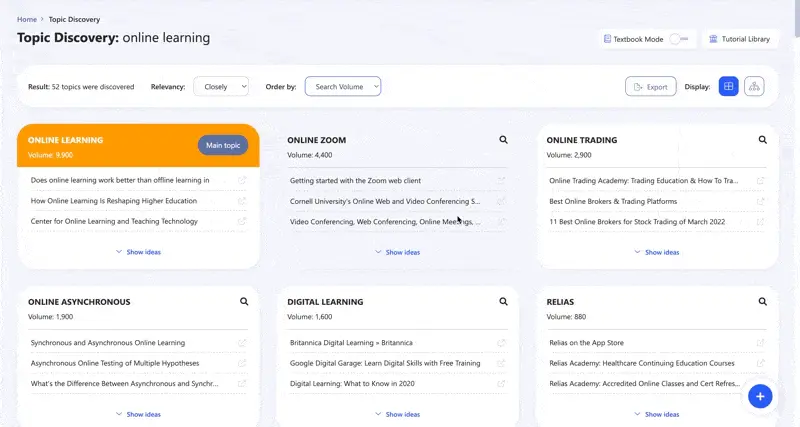
If the cluster function doesn’t give you as many clusters as you want, simply readjust the cluster level to lower than 7, and it’ll reevaluate.
Take Cues from Your Competitors
Your competitors have been there. They’ve rowed the same boat you’re paddling. They’ve gone through the storm, and now, they’re ranking high on SERPs.
To take cues from your competitors, pay attention to their content pieces that rake in traffic and revenue. Study how they structure them. You'll find related ideas there.
Ian Cleary, Founder of the digital agency RazorSocial, said as much:
“Researching your competitors is extremely important. When you know what’s working for them, you can create your own content around similar topics and give it your own spin. Or you can create similar types of content, such as infographics or interviews.”
There’s a better way to maximize your competitor research and get multiple content topics from one visit.
And that involves using an SEO tool like WriterZen.
Say you visit a competitor’s blog and find “online learning” as one of their target topics.
Don’t settle with that alone.
Find other topics around “online learning” by inputting the keyword into WriterZen’s Topic Discovery:
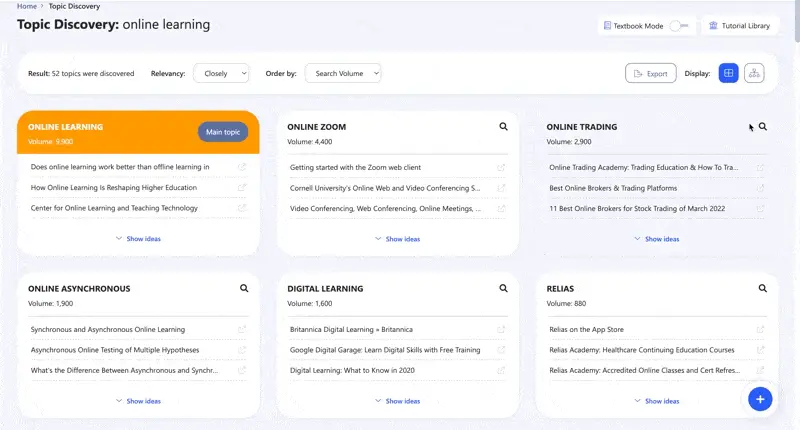
See?
It fetches other competing articles and many other angles to target from online learning alone. You can also adjust the filter based on relevancy or search volumes:
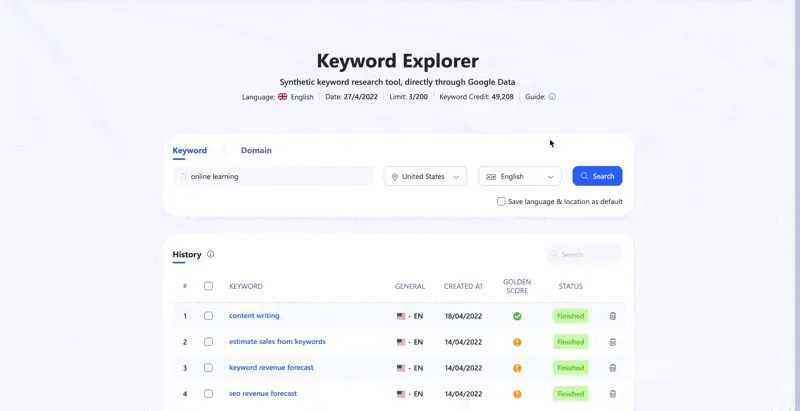
Relevancy lets you find closely, medium, and widely related results (100 URLs) to select topic ideas relevant to yours. The search volume enables you to pick high-volume topics that’ll become the subtopics (clusters) you’ll link to your pillar page.
That aside, when you click on “Show ideas,” you’ll see related Google searches and other Google suggest insights that can serve as interesting content topics to write about.
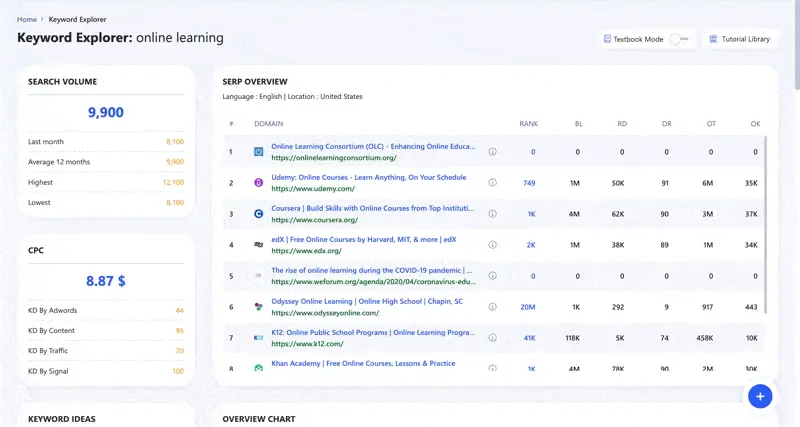
And if you find a particular topic you’d like to zero in on, just hit the little search icon above it, and presto! The Topic Discovery tool will find other ideas related to it.
Take a look:
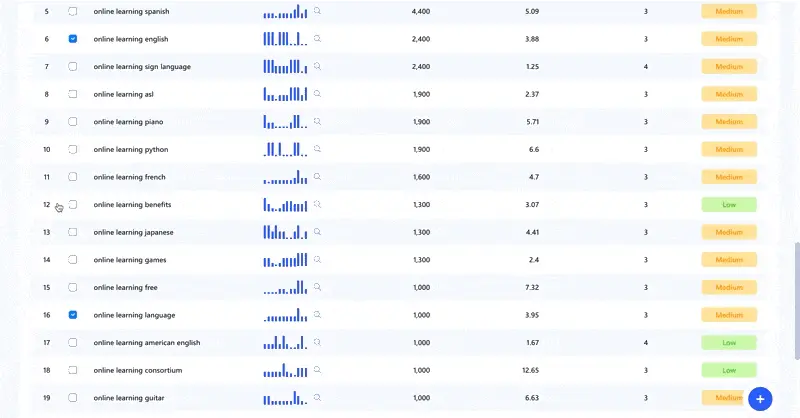
Immerse Yourself in Your Industry
You can also take cues from trending issues in your industry by listening to podcasts, attending webinars, reading stories from top sources, etc.
Also, don’t be reluctant to consume industry resources offline. Visit libraries and bookstores to explore less popular histories and information.
Hear it from QuickSprout:
“Libraries offer access not only to books but also to newspapers, journals, encyclopedias, and archival documents that are simply not online because there’s no interest in them. In these records, though, there is enough research to power up a blog for years on end.”
Besides, interviewing experts is another way to find interesting topics to write about. You’ll be surprised how a single chat with an expert can trigger lots of cool topics to write about, especially when you analyze their opinions.
Find Interesting Topics, Craft High-Quality Content with WriterZen
According to the CMI, 31% of B2B and B2C content marketers see blog posts as the best-performing content type for building brand awareness.
Similarly, HubSpot reports that B2B marketers who blog get 67% more leads than those who don’t.
Those are just two of the countless data that prove the effectiveness of content marketing.
Use all you've learned in this piece when you find yourself in a creative rut that blurs your ability to find new topic ideas.
Get the topics and craft them into excellent articles that make it to SERPs and attract traffic.
But if, while doing this, you find yourself struggling to write, do as Emily Taylor Gregory, Marketing Director at Longitude, advised:
“To ensure you develop high-achieving content for your audience, find a unique angle and then develop it fully — going both deep and wide on topics that answer the questions of your audience. Aim to create content that is ten times better than anything currently in the SERPs.”
Execute it with an AI Writing Assistant by your side. One that simplifies your content research, sharpens your content creation, and better articulates your thoughts:
